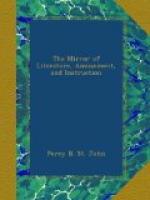Before his arrival at Bagdad, Osmyn had already eaten half-a-dozen of the pastilles, and consequently carried with him half-a-dozen poems, beside which were to fade the productions of the greatest Eastern poets. But he soon found that pretenders to talent often succeed better than those who really possess it. He felt the necessity of connecting himself with literary men, and men of the world; but he only found them occupied with their business, their pleasures, or their own pretensions. Under what title could he present himself? Under that of a poet? The court and the city overflowed with them; they had already filled every avenue. To consult his fellows would be to consult his rivals; to ask their praises would be to ask a miser for his treasures. Besides, so many books appeared, that people did not care to read. However, Osmyn’s works were published, but they were not even noticed in the multitude of similar productions.
After having vegetated four or five years at Bagdad, without obtaining anything but weak encouragement given by wise men, (who are without influence because they are wise,) poor Osmyn began to lose the brilliant hopes that formerly had dazzled him. However, by dint of eating the pastilles, he at last attracted some notice. If it requires time for genius to emerge from obscurity, no sooner is it known than recompense is made for slow injustice. It is sought after not for itself, but for the sake of vanity. Envy often avails itself of it as a fit instrument subservient to its own purposes. Soon, in fact, the works of Osmyn only were spoken of, and after languishing a long time unnoticed, he saw himself at once raised to the pinnacle, without having passed the steps which lead from misery to fortune, from obscurity to glory.
The Caliph desired to see so great a genius, and to possess him at his court. Osmyn was overwhelmed with favours; he sung the praises of the Caliph with a delicacy that other poets were far from being able to imitate. The Caliph admired delicate praise the more because it is rare at court.
So much merit and favour besides, soon created the jealousy of other poets, and likewise of the courtiers. Even those, who had showed themselves the most enthusiastic admirers of Osmyn’s talents, feared to see themselves eclipsed by this new comer, and resolved to destroy the idol they had raised so much higher than they wished.
One of the poets, Osmyn’s enemy, was employed to compose a satire against the Caliph, and it was agreed that this should be circulated under the favourite’s name. From that time the avenger of the common cause never quitted Osmyn, nor ceased to load him with praises and caresses.
One day when Osmyn delivered an extempore poem before the Caliph, his rival, after having warmly applauded him, cast down his eyes by accident, and saw shining on the floor one of the pastilles that Osmyn, who was led away by the vivacity of his declamation, had let fall by mistake. The traitor snatched it up, and put it mechanically in his mouth.




